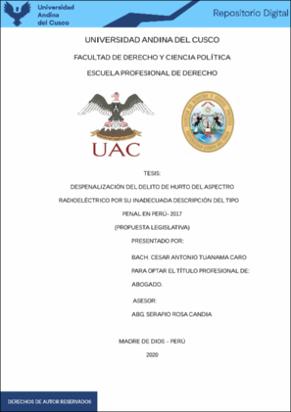| dc.contributor.advisor | Rosa Candia, Serapio | |
| dc.contributor.author | Tuanama Caro, Cesar Antonio | |
| dc.date.accessioned | 2021-05-26T00:19:40Z | |
| dc.date.available | 2021-05-26T00:19:40Z | |
| dc.date.issued | 2017-06-27 | |
| dc.identifier.uri | https://hdl.handle.net/20.500.12557/3839 | |
| dc.description.abstract | El espectro radioeléctrico es un recurso natural limitado compuesto por el conjunto de
ondas electromagnéticas que se propagan por el espacio sin necesidad de guía artificial y
utilizado para la prestación de servicios de telecomunicaciones, radiodifusión sonora y
televisión. En nuestro país, el espectro radioeléctrico forma parte del patrimonio de la
Nación y el uso por los particulares está directamente relacionado con el otorgamiento de
una concesión o autorización administrativa por parte del Ministerio de Transportes y
Comunicaciones. En ese sentido, nuestro sistema normativo ha implementado, medidas
sancionadoras de carácter administrativo contra los que usen el espectro radioeléctrico sin
autorización del Ministerio de Transportes y Comunicaciones reguladas en la Ley de Radio
y Televisión N° 28278 y por el Texto Único Ordenado del Reglamento General de la Ley
de Telecomunicaciones, aprobado por Decreto Supremo N° 020-2007-MTC, constituyendo
infracción pecuniaria de 30 a 50 UIT, con decomiso de los equipos de transmisión. En el
año 2006, durante el gobierno presidencial del Eco. Alejandro Toledo se aprueba la Ley N°
28848, incorporando como una agravante del delito de hurto, la utilización ilegal del
espectro radioeléctrico por no contar con la autorización del Ministerio de Transportes y
Comunicaciones y castigando con hasta ocho años de pena privativa de libertad. La
investigación tiene por objeto precisar si existen razones legales que justifican una
propuesta legislativa para despenalizar el delito de hurto del espectro radioeléctrico en el
Perú - 2017. | es_PE |
| dc.description.abstract | The radio spectrum is a limited natural resource composed of the set of electromagnetic
waves that propagate through space without the need for artificial guidance and used for
the provision of telecommunications, sound and television broadcasting services. In our
country, the radio spectrum is part of the Nation's assets and the use by individuals is
directly related to the granting of an administrative concession or authorization by the
Ministry of Transportation and Communications. In that sense, our regulatory system has
implemented, sanctioning measures of an administrative nature against those who use the
radio spectrum without authorization of the Ministry of Transportation and
Communications regulated in the Law of Radio and Television No. 28278 and by the
Single Ordered Text of the General Regulation of the Telecommunications Law, approved
by Supreme Decree No. 020-2007-MTC, constituting a pecuniary infraction of 30 to 50
UIT, with decomposition of transmission equipment. In 2006, during the presidential
government of the Eco. Alejandro Toledo approved Law No. 28848, incorporating as an
aggravating crime of theft, the illegal use of the radio spectrum for not having the
authorization of the Ministry of Transportation and Communications and punishment with
up to eight years of imprisonment. The investigation is aimed at whether there are legal
reasons that justify a legislative proposal to decriminalize the crime of theft of the radio
spectrum in Peru - 2017. | en_US |
| dc.description.uri | Tesis | es_PE |
| dc.format | application/pdf | es_PE |
| dc.language.iso | spa | es_PE |
| dc.publisher | Universidad Andina del Cusco | es_PE |
| dc.rights | info:eu-repo/semantics/openAccess | es_PE |
| dc.rights.uri | https://creativecommons.org/licenses/by-nc-nd/2.5/pe/ | es_PE |
| dc.source | Universidad Andina del Cusco | es_PE |
| dc.source | Repositorio Institucional UAC | es_PE |
| dc.subject | Legalidad | es_PE |
| dc.subject | Tipicidad | es_PE |
| dc.subject | Utilizar | es_PE |
| dc.subject | Apropiar | es_PE |
| dc.subject | Aspectro radioeléctrico | es_PE |
| dc.title | Despenalización del delito de hurto del aspectro radioeléctrico por su inadecuada descripción del tipo penal en Perú- 2017 (Propuesta Legislativa) | es_PE |
| dc.type | info:eu-repo/semantics/bachelorThesis | es_PE |
| thesis.degree.name | Abogado | es_PE |
| thesis.degree.grantor | Universidad Andina del Cusco. Facultad de Derecho y Ciencia Política | es_PE |
| thesis.degree.level | Titulo Profesional | es_PE |
| thesis.degree.discipline | Derecho | es_PE |
| dc.publisher.country | PE | es_PE |
| dc.subject.ocde | https://purl.org/pe-repo/ocde/ford#5.05.01 | en_US |
| renati.advisor.dni | 10727380 | |
| renati.author.dni | 45300281 | |
| renati.discipline | 421016 | |
| renati.juror | Ochoa Saire, Fredy | |
| renati.juror | Camarena Quispe, Rolando José | |
| renati.juror | Huanaco Huanca, Raúl Andy | |
| renati.juror | Sequeiros Ataucuri, Carlos Irineo | |
| renati.level | https://purl.org/pe-repo/renati/level#tituloProfesional | es_PE |
| renati.type | https://purl.org/pe-repo/renati/type#tesis | es_PE |


